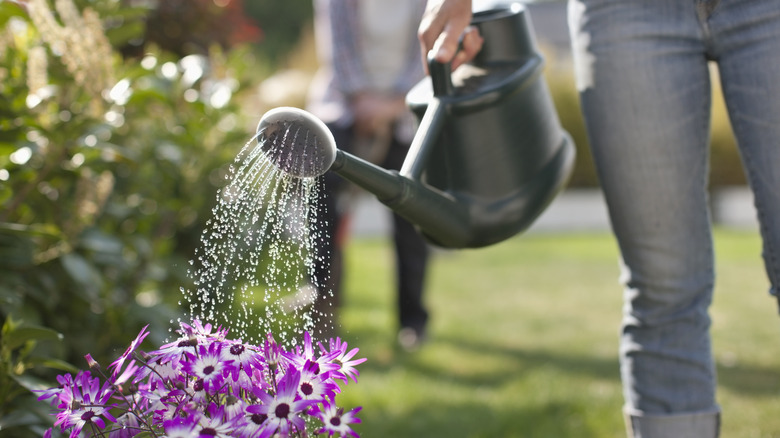Why You Should Start Watering Your Plants With Milk
There are mistakes you may want to avoid while watering your garden, such as overwatering. Some gardeners may debate which is best for plants: rainwater or distilled water. There are numerous guidelines about what time of day is best to water your lawn. However, there is one thing that most plant-growers can likely agree on: that you should water your plants with, well, water. But what if there was another solution? One that offers proteins, minerals, and bacteria that may benefit plant vitality. That solution is milk.
Milk, beyond its role in strengthening plants, presents potential benefits in preventing and treating fungal and bacterial diseases. Some gardeners even claim it works as good leaf polish. Being naturally occurring and non-chemical, it achieves all of this without harming insects in pots and beds. However, it's crucial to view milk as a supplement, not a substitute, for water. Plants still rely on water for hydration and survival.
The power of milk for plants
Like humans, plants need calcium for growth and strength. Luckily, milk has calcium in abundance. This calcium is used by plants as a building block for strong cell walls, which allows them to remain healthy. In addition to building robust walls, calcium is also necessary to prevent diseases such as blossom end rot, which occurs when a plant experiences a calcium deficiency.
Microbes in soil break down organic matter and make nutrients more available for plants. The sugars and proteins in milk could act as a food source for these microbes, encouraging their growth and ultimately benefiting plant health. However, be cautious, as milk could also attract unwanted organisms to your garden, such as flies and ants drawn to sugar or fungi that feed on organic matter.
A diluted milk spray can act as a gentle fungicide, helping to combat powdery mildew, a white fungal growth that can harm leaves. Milk might also prove effective against aphids, which are soft-bodied insects that suck sap from plants; however, be aware that any evidence supporting this claim is purely anecdotal.
Other considerations
Remember, while milk may offer benefits to your plants, it should not replace regular watering. The best approach here is to dilute the water you use for your plants with milk. In this case, it's best to start gently with one-part milk to a 10-part water solution, although you may need to increase this. A spray made up of 40% milk and 60% water was found as effective as chemical fungicides, according to a 2011 University of Connecticut study.
There's also some debate about using expired milk for watering. While it might not harm plants, the effectiveness of its nutrients could be diminished. Opting for fresh or close-to-expiry milk might be a safer bet.
Lastly, it's worth noting that milk watering might not be suitable for all plants. Before giving your entire garden a milky makeover, test it on a small area of one plant first. Monitor its reaction for a few days. If you see signs of stress like wilting or discoloration, it's best to avoid using milk on that particular plant.


